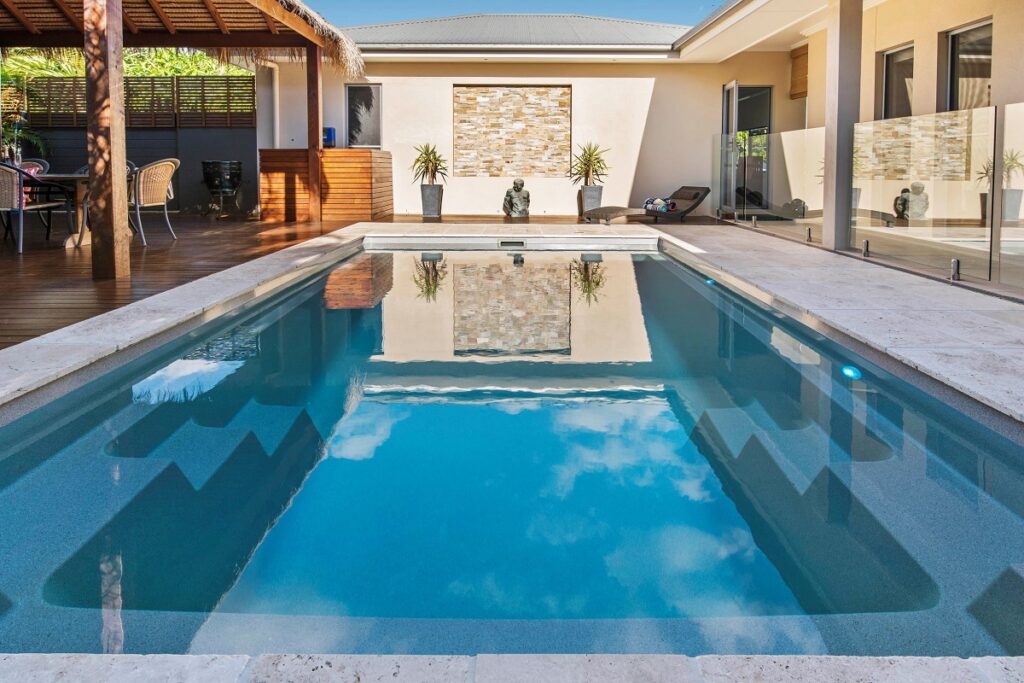

Swimming pool installation can be almost as fun as using them! Whether you’re looking for a fibreglass above-ground pool or a fibreglass in-ground pool, you have plenty of options, depending on which swimming pool would be best for you and your land. Once you have made your decision about which swimming pool you would like to put in your backyard, the next important decision to be made is what type of water you want in the pool. There are three main types of swimming pool water systems: chlorine, saltwater, and mineral. Below we’ll break down the advantages and disadvantages of each type and what might be best for each type of swimming pool.

Chlorine is one of the oldest and best sanitising options for pools – for the one simple reason in that it kills bacteria. Chlorine is used not only in the water that is poured into the pool to begin with, it’s also used to clean the pool. This is usually done once per week, with either liquid chlorine (the most popular option due to its longevity, ability to be purchased in bulk, and cost-effectiveness), chlorine tablets (the second-most popular option) and granular chlorine.
One of the major drawbacks of a chlorine-based water system is that it requires a lot of maintenance. Chlorine is generally an unpredictable element as it sometimes reacts too well with too many things. For example, when chlorine mixes with the bacteria from the pool, it creates a substance known as “chloramine”. That’s where that awful ‘swimming pool’ smell comes from. When handling chlorine, just keep in mind that it is a dangerous chemical when stored or handled improperly. Please Note: Narellan Pools are not suited to Chlorine systems.
Saltwater pools are less common but are definitely worth considering. If you choose a saltwater pool, you won’t have to worry about adding chlorine to your pool, you’ll instead add salt, which interacts with a special generator known as a “salt cell generator”, which in turn creates chlorine for you. This helps to bring down your level of work considerably.
One of the main drawbacks with a saltwater system is that it can corrode pool equipment much faster than say, chlorine will. Because salt is a corrosive substance, the introduction of large amounts of salt into a system over time will cause it to decompose quickly. However, there’s a slowing-down fix to this problem known as the sacrificial anode. This anode is made of zinc and gives off more of its own ions faster, causing the salt to ‘attack’ it first and wear through it before ‘attacking’ your other metallic objects in the pool.
Saltwater generally requires less maintenance than chlorine, but keep in mind it requires more money to set up.
Mineral pools are increasing in popularity for several reasons, including their health benefits. The premier mineral pools system, MagnaPool is a natural answer to the question of water possibilities for your above-ground or inground fibreglass swimming pool. MagnaPools contain high concentrations of magnesium – which makes skin feel soft and silky, and this difference is especially noticeable when compared to other methods such as chem dosing or saltwater systems which are more drying to skin and hair. In general, MagnaPools offer a higher quality of water than other alternatives.
Key reasons to go with MagnaPool for your pool water are: your health and your wallet. Magnesium is gentle and helps improve water clarity drastically. You also don’t get the same itchy eyes, dry skin or damaged hair symptoms as you might with chlorinated water.
No matter what type of swimming pool installation you’re looking for, whether it’s a fibreglass above-ground swimming pool or a fibreglass in-ground swimming pool, you have plenty of water options available to you.